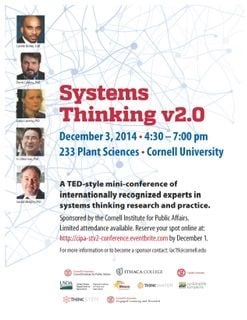Why Do I Need A Mission?
 Derek & Laura Cabrera
·
3 minute read
Derek & Laura Cabrera
·
3 minute read
This post is adapted from Chapter 3 of Flock Not Clock
Why does your organization need a mission? How else does any collective know what’s best to do? In an article called “Why I Hate Mission Statements But Love Missions,” business author and consultant Brad Federman explains
that missions guide organizations into “real action.” Identifying the most important quality, “missions are known,” he explains: “Think about it: would you send a group of soldiers into a conflict without a mission or without them
knowing the mission? No way. But most organizations do just that.”
 The importance of a mission has only increased over time, as we navigate a knowledge economy in a complex world and come to appreciate that all organizations are complex adaptive systems. Training manager Michael Emery explains that missions promote discussions about “who the team is, what the team does, and why they do it.” The definition of what the team does, does not compose a detailed instruction manual. He writes:
The importance of a mission has only increased over time, as we navigate a knowledge economy in a complex world and come to appreciate that all organizations are complex adaptive systems. Training manager Michael Emery explains that missions promote discussions about “who the team is, what the team does, and why they do it.” The definition of what the team does, does not compose a detailed instruction manual. He writes:
"When there is a clear team mission, members know what to do in unexpected situations. At best, a mission statement provides powerful principles for individual and group performance. These are increasingly important issues as companies continue to evolve from control-related strategies to individual behavior management. This is true regardless of what evolution occurs—TQM, self-directed work teams, or even participative management."
The actions prescribed by the mission are its simple rules. We can’t plan for every contingency so we need agents who have rules to guide their on-the-spot decision making and behavior.

We face problems in trying to estimate the effects of missions and their characteristics on organizational outcomes. The definitions employed by academics, consultants, practitioner-scholars, and organizational leaders vary in consequential and substantive ways. Many definitions of mission pack in several discrete phenomena (e.g., corporate standards, strategy, philosophy, values, rationale for existence). We’d be comparing oranges and apples, at best.
Nonetheless, there are some data. A large international study on workers’ quality of life on the job reported the following about the importance of mission: “Only 34% felt a connection to their company’s mission, and those who didn’t feel such a connection were 62% less likely to stay with their employers and 45% less engaged.” The vision and mission of an organization jointly formed the greatest factor influencing employee job satisfaction
and intent to stay. This disconnect fuels what all CEOs dread: disengagement. Reporting on the state of the American workplace in 2013, Gallup wrote about the associated costs.
The vast majority of U.S. workers, 70%, are "not engaged" or
"actively disengaged" at work, meaning they are emotionally
disconnected from their workplace and are less likely to be
productive. Actively disengaged employees alone cost the
U.S. between $450 billion to $550 billion each year in lost
productivity, and are more likely than engaged employees
to steal from their companies, negatively influence their
coworkers, miss workdays, and drive customers away.

What academic studies there are on the effects of mission statements have provided weak and ambiguous results. One study found that mission indirectly affected financial performance. Its effect was indirect: the level of employee commitment to the mission and the “degree to which an organization aligns its internal structure, policies and procedures with its mission” both were positively related with employee behavior. Employee behavior, in turn, was directly related to financial performance.
In the previous posts, we discussed the fact that meaning and purpose are fundamental human needs. Harvard psychologist Amy Cuddy is an expert in human behavior and motivation. Her work, while focused on individual goals,
can help us understand the importance of mission. Cuddy argues that “The biggest mistake a lot of people make in setting goals... is that they focus only on the outcome, not the process.” She explains that big goals (like a corporate vision) can be overwhelming, considering the number of steps along the way to the goal (each of which might bring failure). Her advice is to instead learn to “embrace the process” (love and live the mission, we would say), since much research shows that focusing on incremental change increases performance. So, yes, create an inspirational vision that gets everyone out of bed and excites them about the future, but ground them in the mission. Luke Arthur argues
that having a clear mission that everyone in the company understands “is a sign of a potentially strong culture. Many successful companies know what they are trying to accomplish and are moving in a clear direction.”
.png?width=150&height=150&name=CRL%20GOAT%20Logo%20(4).png)



